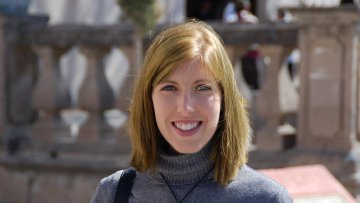TBA
Abstract
The Jacquet-Langlands correspondence gives a relationship between automorphic representations on $GL_2$ and its twisted forms, which are the unit groups of quaternion algebras. Writing this out in more classical language gives a combinatorial way of producing the eigenvalues of Hecke operators acting on modular forms. In this talk, we will first go over notions of modular forms and quaternion algebras, and then dive into an explicit example by computing some eigenvalues of the lowest level quaternionic modular form of weight $2$ over $\mathbb{Q}$.
Hyperelliptic continued fractions
Abstract
We can define a continued fraction for formal series $f(t)=\sum_{i=-\infty}^d c_it^i$ by repeatedly removing the polynomial part, $\sum_{i=0}^d c_it^i$, (the equivalent of the integer part) and inverting the remaining part, as in the real case. This way, the partial quotients are polynomials. Both the usual continued fractions and the polynomial continued fractions carry properties of best approximation. However, while for square roots of rationals the real continued fraction is eventually periodic, such periodicity does not always occur for $\sqrt{D(t)}$. The correct analogy was found by Abel in 1826: the continued fraction of $\sqrt{D(t)}$ is eventually periodic if and only if there exist nontrivial polynomials $x(t)$, $y(t)$ such that $x(t)^2-D(t)y(t)^2=1$ (the polynomial Pell equation). Notice that the same holds also for square root of integers in the real case. In 2014 Zannier found that some periodicity survives for all the $\sqrt{D(t)}$: the degrees of their partial quotients are eventually periodic. His proof is strongly geometric and it is based on the study of the Jacobian of the curve $u^2=D(t)$. We give a brief survey of the theory of polynomial continued fractions, Jacobians and an account of the proof of the result of Zannier.
Computing p-adic L-functions of Hecke characters
Abstract
In 1973, Serre defined $p$-adic modular forms as limits of modular forms, and constructed the Leopoldt-Kubota $L$-function as the constant term of a limit of Eisenstein series. This was extended by Deligne-Ribet to totally real number fields, and Lauder and Vonk have developed an algorithm for interpolating $p$-adic $L$-functions of such fields using Serre's idea. We explain what an $L$-function is and why you should care, and then move on to giving an overview of the algorithm, extensions, and applications.
14:00
TBA
Abstract
In this leisure talk I will show how a sum of squares decomposition problem can be transformed to a problem of semi-definite optimization. Then the practicality of such reformulations will be discussed, illustrated by an explicit example of Artin's solutions to Hilberts 17th problem. Finally I will show how a numerical solution could be turned into a mathematically certified one, using the order structure on the cone of sums of squares.
The talk requires no pre-requisite knowledge of neither optimization or programming and only undergraduate mathematics.
Parameter Estimation for the McKean-Vlasov Stochastic Differential Equation
Abstract
We consider the problem of parameter estimation for a McKean stochastic differential equation, and the associated system of weakly interacting particles. The problem is motivated by many applications in areas such as neuroscience, social sciences (opinion dynamics, cooperative behaviours), financial mathematics, statistical physics. We will first survey some model properties related to propagation of chaos and ergodicity and then move on to discuss the problem of parameter estimation both in offline and on-line settings. In the on-line case, we propose an online estimator, which evolves according to a continuous-time stochastic gradient descent algorithm on the asymptotic log-likelihood of the interacting particle system. The talk will present our convergence results and then show some numerical results for two examples, a linear mean field model and a stochastic opinion dynamics model. This is joint work with Louis Sharrock, Panos Parpas and Greg Pavliotis. Preprint: https://arxiv.org/abs/2106.13751
On the Convergence of Langevin Monte Carlo: The Interplay between Tail Growth and Smoothness
Abstract
We study sampling from a target distribution $e^{-f}$ using the unadjusted Langevin Monte Carlo (LMC) algorithm. For any potential function $f$ whose tails behave like $\|x\|^\alpha$ for $\alpha \in [1,2]$, and has $\beta$-H\"older continuous gradient, we derive the sufficient number of steps to reach the $\epsilon$-neighborhood of a $d$-dimensional target distribution as a function of $\alpha$ and $\beta$. Our rate estimate, in terms of $\epsilon$ dependency, is not directly influenced by the tail growth rate $\alpha$ of the potential function as long as its growth is at least linear, and it only relies on the order of smoothness $\beta$.
Our rate recovers the best known rate which was established for strongly convex potentials with Lipschitz gradient in terms of $\epsilon$ dependency, but we show that the same rate is achievable for a wider class of potentials that are degenerately convex at infinity.


